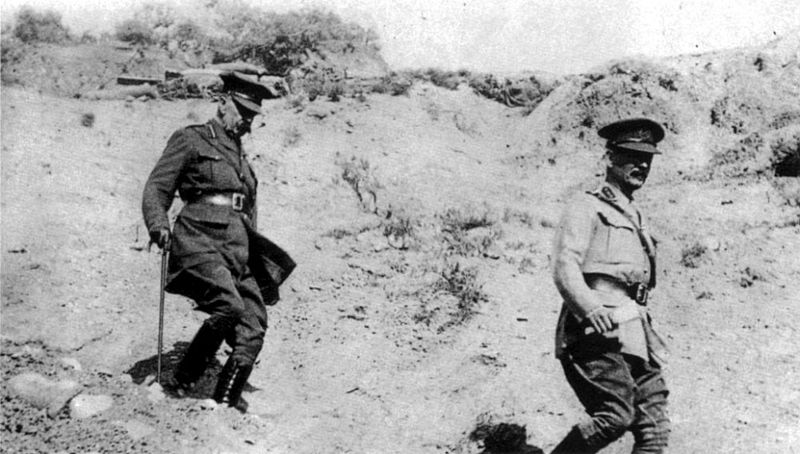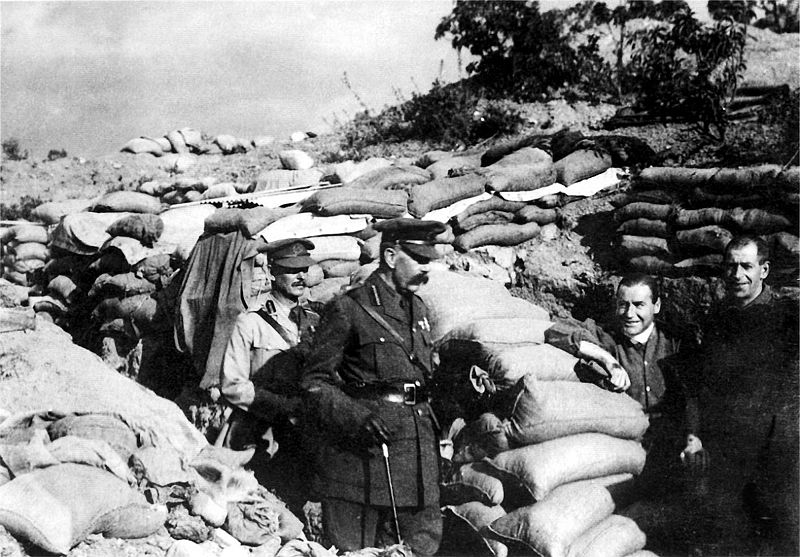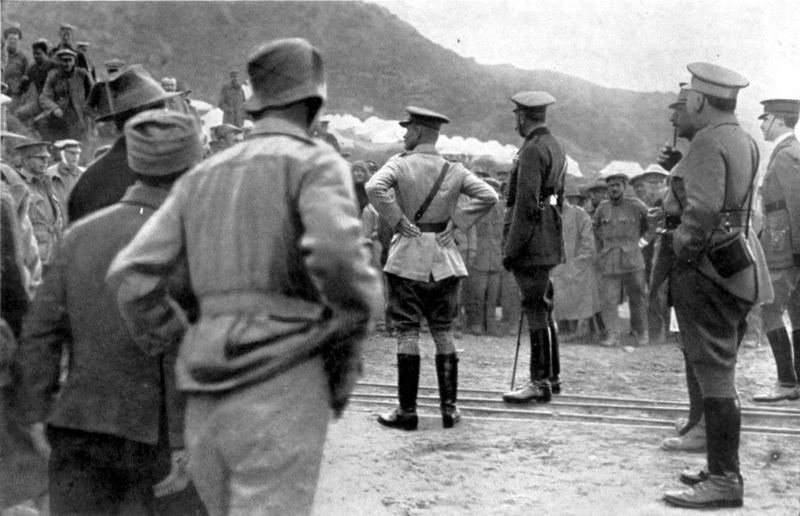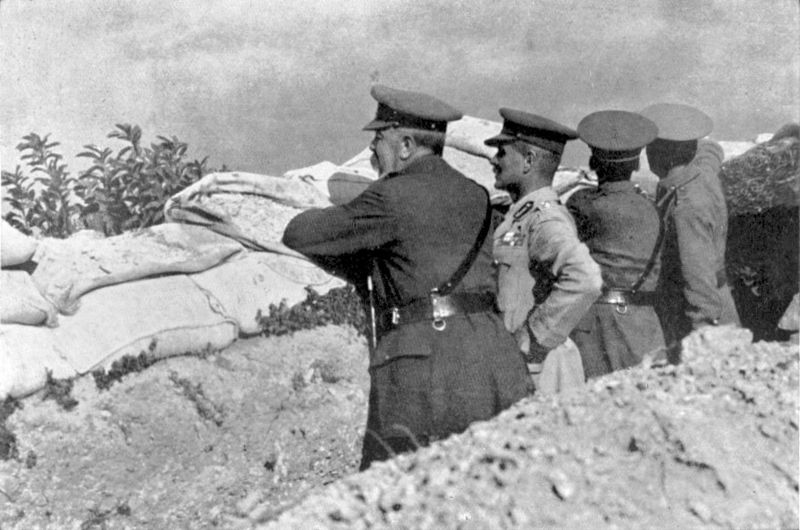<Back to Index>
- Field Marshal of the British Army Horatio Herbert Kitchener, 1850
PAGE SPONSOR
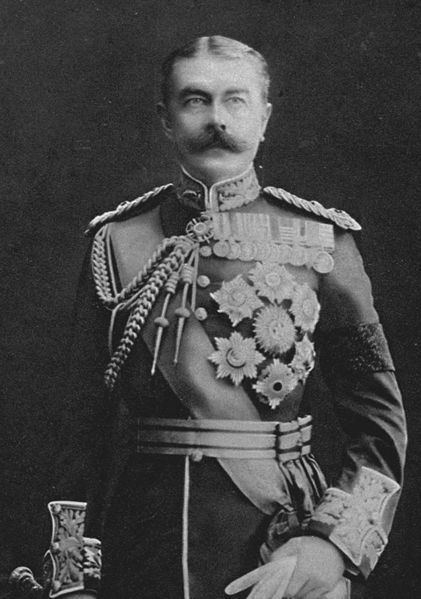
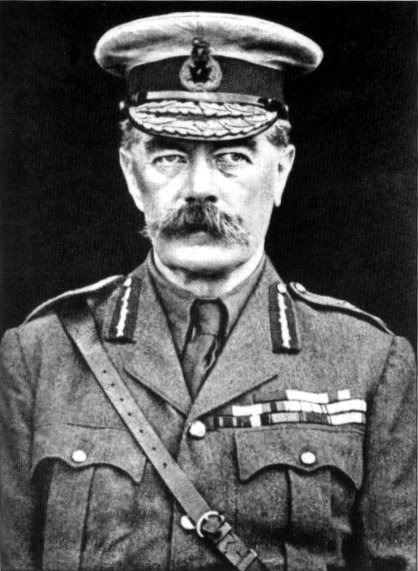
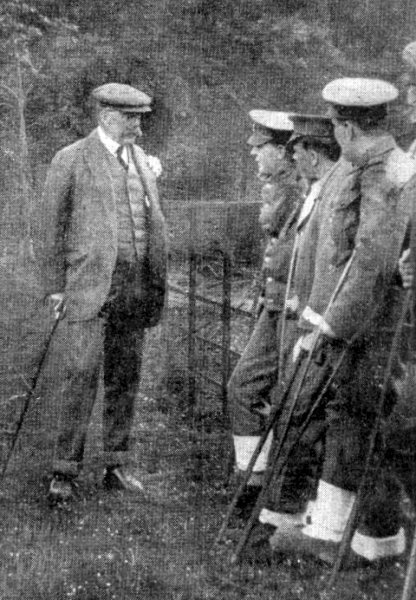
Field Marshal Horatio Herbert Kitchener, 1st Earl Kitchener KG, KP, GCB,OM, GCSI, GCMG, GCIE, ADC, PC (24 June 1850 – 5 June 1916), was an Irish born British Field Marshal and proconsul who won fame for his imperial campaigns and later played a central role in the early part of the First World War, although he died halfway through it.
Kitchener won fame in 1898 for winning the Battle of Omdurman and securing control of the Sudan, after which he was given the title "Lord Kitchener of Khartoum"; as Chief of Staff (1900 – 02) in the Second Boer War he played a key role in Lord Roberts' conquest of the Boer Republics, then succeeded Roberts as commander - in - chief – by which time Boer forces had taken to guerrilla fighting and British forces imprisoned Boer civilians in concentration camps. His term as Commander - in - Chief (1902 – 09) of the Army in India saw him quarrel with another eminent proconsul, the Viceroy Lord Curzon, who eventually resigned. Kitchener then returned to Egypt as British Agent and Consul - General (de facto administrator).
In 1914, at the start of the First World War, Lord Kitchener became Secretary of State for War, a Cabinet Minister. One of the few men to foresee a long war, one in which Britain's victory was far from secure, he organized the largest volunteer army that Britain, and indeed the Empire, had seen and a significant expansion of materials production to fight Germany on the Western Front. His commanding image, appearing on recruiting posters demanding "Your country needs you!", remains recognized and parodied in popular culture to this day. He was blamed for the shortage of shells in the spring of 1915 – one of the events leading to the formation of a coalition government – and stripped of his control over munitions and strategy.
He died in 1916 near the Orkney Islands when the warship taking him to negotiations in Russia was sunk by a German mine.
After his death Kitchener was often dismissed as a great poster but not a great administrator. He was criticized by Lloyd George – who may have taken credit for some of Kitchener's achievements in the field of munitions – in his War Memoirs and by others. After many years' experience of commanding relatively small forces in imperial campaigns, Kitchener had made his reputation worse by his habit of secrecy, unwillingness to explain his actions to his colleagues, and reluctance to organize and delegate.
However, since 1970, new records have opened and historians have to some extent rehabilitated Kitchener's reputation, one historian writing that he consistently rose in ability as he was promoted. Some historians now praise his strategic vision in World War I, especially his laying the groundwork for the expansion of munitions production and his central role in the raising of the British army in 1914 and 1915, which provided an army capable of meeting Britain's continental commitment.
Kitchener was born in Ballylongford near Listowel, County Kerry, in Ireland, son of Lt. Col. Henry Horatio Kitchener (1805 – 1894) and Frances Anne Chevallier - Cole (d. 1864; daughter of The Rev.John Chevallier and his third wife, Elizabeth, née Cole). The family was of a notable Anglo - Irish background:
his father had only recently bought land in Ireland under a scheme to
encourage the purchase of land after the recent potato famine. The year his mother died of tuberculosis, they had moved to Switzerland in an effort to improve her condition; the young Kitchener was educated there and at the Royal Military Academy, Woolwich. Pro-French and eager to see action, he joined a French field ambulance unit in the Franco - Prussian War. His father took him back to England after he caught pneumonia after ascending in a balloon to see the French Army of the Loire in action. He was commissioned into the Royal Engineers on 4 January 1871. His service in France had violated British neutrality, and he was reprimanded by the Duke of Cambridge, the commander - in - chief. He served in Palestine, Egypt, and Cyprus as a surveyor, learned Arabic, and prepared detailed topographical maps of the areas.
In 1874, at age 24, Kitchener was assigned by the Palestine Exploration Fund to a mapping survey of the Holy Land, replacing Charles Tyrwhitt - Drake, who had died of malaria. Kitchener, then an officer in the Royal Engineers, joined fellow Royal Engineer Claude R. Conder and between 1874 and 1877, they surveyed what is today Israel, the West Bank and Gaza, returning to England only briefly in 1875 after an attack by locals in the Galilee, at Safed.
Conder and Kitchener’s expedition became known as the Survey of Western Palestine because it was largely confined to the area west of the Jordan River. The survey collected data on the topography and toponomy of the area, as well as local flora and fauna. The results of the survey were published in an eight volume series, with Kitchener’s contribution in the first three tomes (Conder and Kitchener 1881 – 1885).
This survey has had a lasting effect on the Middle East for several reasons:
- The ordnance survey serves as the basis for the grid system used in the modern maps of Israel and Palestine.
- The collection of data compiled by Conder and Kitchener are still consulted by archaeologists and geographers working in the southern Levant.
- The survey itself effectively delineated and defined the political borders of the southern Levant. For instance, the modern border between Israel and Lebanon is established at the point in the upper Galilee where Conder and Kitchener’s survey stopped.
Kitchener later served as a Vice - Consul in Anatolia, and in 1883, as a British captain with the Turkish rank bimbashi (major), in the occupation of Egypt. Egypt, still in theory a self - governing part of the Ottoman Empire, became a British puppet state, its army led by British officers, from 1883 until technical independence in 1936, but with substantial British influence and military presence continuing until the evacuation of the Suez Base in 1954. The following year Kitchener was an Aide de Camp during the failed Gordon relief expedition in the Sudan. According to verbal reports from William Forde, who was his batman, he was revered by his men for his leadership and fair treatment of subordinates. With his command of Arabic, Kitchener was able to mingle with the local people. At this time his fiancée, and possibly the only female love of his life, Hermione Baker (daughter of Valentine Baker pasha), died of typhoid fever in Cairo; he subsequently had no children. But he raised his young cousin Bertha Chevallier - Boutell, daughter of Kitchener's first - cousin, Sir Francis Hepburn de Chevallier - Boutell.
Major Kitchener served in the 1884 - 85 Nile Campaign as an intelligence officer. Present at Abu Klea. In the late 1880s he was Governor of the Red Sea Territories (which in practice consisted of little more than the Port of Suakin) with the brevet rank of Colonel. He was severely wounded in the jaw during a skirmish, recuperating in England. He also served at the Battle of Toski (1889). Having become Sirdar of the Egyptian Army in 1892 - with the rank of brigadier - general and then major - general in the British Army — in 1896 he led his British and Egyptian forces up the Nile, building a railway to supply arms and reinforcements, and defeating the Sudanese at the Battle of Omdurman on 2 September 1898, near Khartoum.
Kitchener's second tour in the Sudan (1886 – 1899) won him national fame, and he was made Aide de Camp to Queen Victoria and appointed a Knight Commander of the Bath (KCB). However, this campaign also made his brutality infamous, an aspect of his tactics that became well known after the Boer War. After victory in the Battle of Omdurman the remains of the Mahdi were exhumed and scattered. Kitchener quite possibly prevented war between France and Britain when he dealt firmly but non - violently with the French military expedition under Captain Marchand to claim Fashoda, in what became known as the Fashoda Incident.
He was created Baron Kitchener, of Khartoum and of Aspall in the County of Suffolk, on 31 October 1898 as a victory title commemorating his successes, and began a programme restoring good governance to the Sudan. The programme had a strong foundation based on education, Gordon Memorial College being its centrepiece, and not simply for the children of the local elites — children from anywhere could apply to study.
He ordered the mosques of Khartoum rebuilt and instituted reforms which recognized Friday — the Muslim holy day — as the official day of rest, and guaranteed freedom of religion to all citizens of the Sudan. He attempted to prevent evangelical Christian missionaries from attempting to convert Muslims to Christianity.
Kitchener rescued a substantial charitable fund which had been diverted into the pockets of the Khedive of Egypt, and put it to use improving the lives of the ordinary Sudanese.
He
also reformed the debt laws, preventing rapacious moneylenders from
stripping away all assets of impoverished farmers, guaranteeing them 5
acres (2 ha) of land to farm for themselves and the tools to farm
with. In 1899 Kitchener was presented with a small island in the Nile at Aswan in gratitude for his services; the island was renamed Kitchener's Island in his honour.
During the Second Boer War (1899 – 1902), Kitchener arrived with Lord Roberts on the RMS Dunottar Castle and the massive British reinforcements of December 1899. Officially holding the title of chief of staff, he was in practice a second - in - command, and commanded a much criticised frontal assault at the Battle of Paardeberg in February 1900.
Following the defeat of the conventional Boer forces, Kitchener succeeded Roberts as overall commander in November 1900, and after the failure of a reconciliatory peace treaty in February 1901 (due to British cabinet veto) which Kitchener had negotiated with the Boer leaders, Kitchener inherited and expanded the successful strategies, including concentration camps and the scorched earth policy, devised by Roberts to force the Boer commandos to submit.
In a brutal campaign, these strategies removed civilian support from the Boers with a scorched earth policy of destroying Boer farms, slaughtering livestock, building blockhouses, and moving women, children and the elderly into concentration camps. Conditions in these camps, which had been conceived by Roberts as a form of controlling the families whose farms he had destroyed, began to degenerate rapidly as the large influx of Boers outstripped the ability of the minuscule British force to cope. The camps lacked space, food, sanitation, medicine, and medical care, leading to rampant disease and a staggering 34.4% death rate for those Boers who entered. The biggest critic of the camps was the Englishwoman, humanitarian and welfare worker Emily Hobhouse. Despite being largely rectified by late 1901, they led to wide opprobrium in Britain and Europe, and especially amongst South Africans.
The Treaty of Vereeniging was signed in 1902 following a tense six months. During this period Kitchener struggled against Sir Alfred Milner, the Governor of the Cape Colony and the British government. Milner was a hard line conservative and wanted forcibly to Anglicize the Afrikaans people (the Boers), and Milner and the British government wanted to assert victory by forcing the Boers to sign a humiliating peace treaty, while Kitchener wanted a more generous compromise peace treaty that would recognize certain rights for the Afrikaners and promise future self - government. Eventually the British government decided the war had gone on long enough and sided with Kitchener against Milner. (Louis Botha, the Boer leader with whom Kitchener negotiated his aborted peace treaty in 1901, became the first Prime Minister of the self - governing Union of South Africa in 1910.) The treaty also agreed to pay for reconstruction following the end of hostilities. Six days later Kitchener, who had risen from major - general to the brevet rank of full general during the war, was created Viscount Kitchener, of Khartoum and of the Vaal in the Colony of Transvaal and of Aspall in the County of Suffolk.
In the "Breaker Morant" case several soldiers from Australia were arrested and court martialled for
summarily executing Boer prisoners and also for the murder of a German
missionary believed to be a Boer sympathizer. The celebrated horseman
and bush poet Lt. Harry "Breaker" Morant and Lt. Peter Handcock were found guilty, sentenced to death and shot by firing squad at Pietersburg on 27 February 1902. Their death warrants were personally signed by Kitchener. He reprieved a third soldier, Lt. George Witton who served 28 months before being released.
Following this, Kitchener was made Commander - in - Chief, India (1902 – 1909) – his term of office was extended by two years — where he reorganized the Indian Army. While many of his reforms were supported by the Viceroy Lord Curzon of Kedleston, who had originally lobbied for Kitchener's appointment, the two men eventually came into conflict over the question of military administration. While later events ultimately proved Curzon was right in opposing Kitchener's attempts to concentrate all military decision making power in his own office, the Commander - in - Chief's intrigues won him the crucial support of the government in London and the Viceroy in turn chose to resign.
He presided over the Rawalpindi Parade 1905 to honour the Prince and Princess of Wales' visit to India. Later in India Kitchener broke his leg badly in a horse riding accident, leaving him with a slight limp for the rest of his life. Kitchener was promoted to the highest Army rank, Field Marshal, in 1910 and went on a tour of the world. He aspired to be Viceroy of India, but the Secretary of State for India, John Morley, was not keen and hoped to send him instead to Malta as Commander - in - Chief of British forces in the Mediterranean, even to the point of announcing the appointment in the newspapers. Kitchener pushed hard for the Viceroyalty, returning to London to lobby Cabinet ministers and the dying King Edward VII, from whom, whilst collecting his Field - Marshal's baton, Kitchener obtained permission to refuse the Malta job. However, perhaps in part because he was thought to be a Tory (the Liberals were in office at the time) and perhaps due to a Curzon inspired whispering campaign, but most importantly because Morley, who was a Gladstonian and thus suspicious of imperialism, felt it inappropriate, after the recent grant of limited self - government under the 1909 Indian Councils Act, for a serving soldier to be Viceroy (in the event no serving soldier was appointed Viceroy until Archibald Wavell in 1943), Morley could not be moved. The Prime Minister, Herbert Henry Asquith, was sympathetic but was unwilling to overrule Morley, who threatened resignation, so Kitchener was finally turned down for the post of Viceroy of India in 1911.
Kitchener then returned to Egypt as British Agent and Consul - General in Egypt (the job formerly held by Lord Cromer) and of the Anglo - Egyptian Sudan (1911 – 1914, during the formal reign of Abbas Hilmi II as Khedive (nominally Ottoman monarch) of Egypt, Sovereign of Nubia, of the Sudan, of Kordofan and of Darfur).
Kitchener was created Earl Kitchener, of Khartoum and of Broome in the County of Kent, on 29 June 1914. Unusually, provision was made for the title to be passed on to his brother or nephew, since Kitchener was not married and had no children. He was succeeded by his older brother, Colonel Henry Kitchener, 2nd Earl Kitchener.
At the outset of World War I, the Prime Minister, Asquith, quickly had Lord Kitchener appointed Secretary of State for War; Asquith had been filling the job himself as a stopgap following the resignation of Colonel Seeley over the Curragh Incident earlier
in 1914, and Kitchener was by chance briefly in Britain on leave when
war was declared. Against cabinet opinion, Kitchener correctly predicted
a long war that would last at least three years, require huge new
armies to defeat Germany, and suffer huge casualties before the end
would come. Kitchener stated that the conflict would plumb the depths of
manpower "to the last million."
A massive recruitment campaign began, which soon featured a distinctive poster of Kitchener, taken from a magazine front cover. It may have encouraged large numbers of volunteers and has proven to be one of the most enduring images of the war, having been copied and parodied many times since.
In January 1915 French, with the concurrence of senior commanders (eg., Haig), wanted the New Armies incorporated into existing divisions as battalions rather than sent out as entire divisions. He took the step of appealing to the Prime Minister, Asquith, over Kitchener’s head, but Asquith refused to overrule Kitchener. This was a further factor in the deterioration of relations between French and Kitchener, who had travelled to France during the Battle of the Marne to order French to resume the offensive. However, French felt that the war would be over by the summer before the New Army divisions were deployed, as Germany had recently redeployed some divisions to the east. This did not happen, and New Army divisions began to be deployed from the Battle of Loos in September 1915.
Kitchener warned French in January 1915 that the Western Front was a siege and could not be breached, although this was in the context of Cabinet discussions about amphibious landings on the Baltic or North Sea Coast, or against Turkey. In an effort to find a way to relieve pressure on the Western front, Lord Kitchener proposed an invasion of Alexandretta with Australian and New Zealand Army Corps (ANZAC), New Army, and Indian troops. Alexandretta was an area with a large Christian population and was the strategic centre of the Ottoman Empire's railway network — its capture would have cut the empire in two. Yet he was instead eventually persuaded to support Winston Churchill's disastrous Gallipoli campaign in 1915 – 1916. (Churchill's responsibility for the failure of this campaign is debated.) That failure, combined with the Shell Crisis of 1915 – amidst press publicity engineered by Sir John French – was to deal Kitchener's political reputation a heavy blow; Kitchener was popular with the public, so Asquith retained him in office in the new coalition government, but responsibility for munitions was moved to a new ministry headed by David Lloyd George.
Kitchener was a sceptic about the tank, which is why it was developed under the auspices of Churchill’s Admiralty.
Later in 1915 Kitchener was sent on a tour of inspection of Gallipoli and the Near East, in the hope that he could be persuaded to remain in the region as commander - in - chief. Douglas Haig – at that time involved in intrigues to have Robertson appointed Chief of the Imperial General Staff – recommended that Kitchener be appointed Viceroy of India (“where trouble was brewing”) but not to the Middle East, where his strong personality would lead to that sideshow receiving too much attention and resources. At the end of 1915, the new CIGS, Sir William Robertson, took office only on condition that he was granted the right to speak for the Army to the Cabinet in matters of strategy, leaving Kitchener solely with responsibility for manpower and recruitment. Whereas Kitchener had hoped to hold his armies in reserve to administer the coup de grace to Germany after the other warring nations had exhausted themselves, Robertson was suspicious of efforts in the Balkans and Near East, and was instead committed to major British offensives against Germany on the Western Front — the first of these was to be the Somme in 1916.
Early in 1916 Kitchener visited Douglas Haig, newly appointed Commander - in - Chief of the BEF in France. Kitchener had been a key figure in the removal of Haig's predecessor Sir John French, with whom he had a poor relationship. Haig differed with Kitchener over the importance of Mediterranean efforts and wanted to see a strong General Staff in London, but nonetheless valued Kitchener as a military voice against the folly of civilians like Churchill. However, he thought Kitchener "pinched, tired and much aged", and thought it sad that his mind was “losing its comprehension” as the time for decisive victory on the Western Front (as Haig and Robertson saw it) approached. Kitchener was somewhat doubtful of Haig's plan to win decisive victory in 1916, and would have preferred smaller and purely attritional attacks, but sided with Robertson in telling the Cabinet that the planned Anglo - French offensive on the Somme should go ahead.
Kitchener was under pressure from French Prime Minister Aristide Briand (29 March 1916) for the British to attack on the Western Front to help relieve the pressure of the German attack at Verdun. The French refused to bring troops home from Salonika, which Kitchener thought a play for the increase of French power in the Mediterranean.
In May 1916, preparations were made for Kitchener and Lloyd George to visit Russia on a diplomatic mission. Lloyd George was otherwise engaged with his new Ministry and so it was decided to send Kitchener alone.
A week before his death, Kitchener confided to Lord Derby that he intended to press relentlessly for a peace of reconciliation, regardless of his position, when the war was over, as he feared that the politicians would make a bad peace.
On 4 June 1916, Lord Kitchener personally answered questions asked by politicians about his running of the war effort; at the start of hostilities Kitchener had ordered two million rifles with various US arms manufacturers. Only 480 of these rifles had arrived in the UK by 4 June 1916. The numbers of shells supplied were no less paltry. Kitchener explained the efforts he had made in order to secure alternative supplies. He received a resounding vote of thanks from the 200+ Members of Parliament who had arrived to question him, both for his candour and for his efforts to keep the troops armed; Sir Ivor Herbert, who, a week before, had introduced the failed vote of censure in the House of Commons against Kitchener's running of the War Department, personally seconded the motion.
In addition to his military work, Lord Kitchener contributed to efforts on the home front. The knitted sock patterns of the day used a seam up the toe, that could rub uncomfortably against the toes. Kitchener encouraged British and American women to knit for the war effort, and contributed a sock pattern featuring a new technique for a seamless join of the toe, still known as Kitchener stitch.
Blue plaques have been erected to mark where he lived in Westminster and Canterbury.
Lord Kitchener sailed from Scrabster to Scapa Flow on 5 June 1916 aboard HMS Oak before transferring to the armoured cruiser HMS Hampshire for his diplomatic mission to Russia. Shortly before 1930 hrs the same day, while en route to the Russian port of Arkhangelsk during a Force 9 gale, Hampshire struck a mine laid by the newly launched German U-boat U-75 (commanded by Curt Beitzen) and sank west of the Orkney Islands. Kitchener, his staff, and 643 of the crew of 655 were drowned or died of exposure. His body was never found. The survivors who caught sight of him in those last moments testified to his outward calm and resolution.
Not everyone mourned Kitchener's loss. C.P. Scott, editor of the The Manchester Guardian,
is said to have remarked that "as for the old man, he could not have
done better than to have gone down, as he was a great impediment
lately."
The suddenness of Kitchener's death, combined with his great fame and the fact that his body was never recovered, almost immediately gave rise to conspiracy theories which have proved long lived.
The fact that newly appointed Minister of Munitions (and future prime minister) David Lloyd George was supposed to accompany Kitchener on the fatal journey, but cancelled at the last moment, has been given significance by some. This fact, along with the alleged lethargy of the rescue efforts, has led some to claim that Kitchener was assassinated, or that his death would have been convenient for a British establishment that had come to see him as a figure from the past who was incompetent to wage modern war.
After the war, a number of conspiracy theories were put forward, one by Lord Alfred Douglas, positing a connection between Kitchener's death, the recent naval Battle of Jutland, Winston Churchill and a Jewish conspiracy. (Churchill successfully sued Douglas for criminal libel and the latter spent six months in prison.) Another claimed that the Hampshire did not strike a mine at all, but was sunk by explosives secreted in the vessel by Irish Republicans.
In 1926, a hoaxer named Frank Power claimed Kitchener's body had been found by a Norwegian fisherman. Power brought a coffin back from Norway and prepared it for burial in St. Paul's. At this point, however, the authorities intervened and the coffin was opened in the presence of police and a distinguished pathologist. The box was found to contain only tar for weight. There was widespread public outrage at Power, but he was never prosecuted.
General Erich Ludendorff, Generalquartiermeister and
joint head (with von Hindenburg) of Germany's war effort stated that
Russian communist elements working against the Tzar had betrayed
Kitchener's travel plans to Germany. He stated that Kitchener was killed
"because of his ability" as it was feared he would help the Czarist
Russian Army to recover.
The role of Captain Fritz Joubert Duquesne in Kitchener's death has been hypothesised / documented in several books and movies:
- The Man Who Killed Kitchener; the Life of Fritz Joubert Duquesne, 1879 –, by Clement Wood, 1932.
- Sabotage! The Secret War Against America, by Michael Sayers & Albert E. Kahn, 1942.
- The House on 92nd Street, which won screenwriter Charles G. Booth an Academy Award for the best original motion picture story in 1945.
- Counterfeit Hero: Fritz Duquesne, Adventurer and Spy, by Art Ronnie, 1995
- Fräulein Doktor, a Dino DeLaurentis film, 1969.
- The Man Who Would Kill Kitchener, by François Verster, a documentary film on the life of Fritz Joubert Duquesne that won six Stone awards, 1999.
Captain Duquesne, a Boer Army officer and later a spy in the Second Boer War, hated Kitchener because of his scorched earth policy and he hated the British in general for abusing his family in the concentration camps. He was captured and sent to Lisbon as a prisoner of war, but he soon escaped and returned to South Africa via London as a Captain in the British Army. He attempted to kill Lord Kitchener in Cape Town, but was betrayed by the wife of one of his co-conspirators. Duquesne was sentenced to life in prison and sent to Bermuda, but he escaped to the United States and became a U.S. citizen, and he even served as a consultant on African big game hunting to President Theodore Roosevelt and others. In World War I, Duquesne became a German spy and planted explosive devices on British ships in South America, sinking 22. He claims to have posed as the Russian Duke Boris Zakrevsky in 1916 and joined Kitchener in Scotland. While on board H.M.S. Hampshire with Kitchener, Duquesne supposedly signalled the German submarine that sank the destoyer, and he got off by using a life raft before the ship sank, rescued by the submarine. He was apparently awarded the Iron Cross for his efforts. Duquesne was later apprehended and tried by the authorities in the U.S. on the charge of sabotage, but he managed to escape yet again. In World War II, Captain Duquesne ran a huge German spy ring in the United States until he was caught by the FBI in what became the biggest round up of spies in U.S. history: the Duquesne Spy Ring.
In
1883 Kitchener became a Freemason. He was initiated in Cairo at La
Concordia Lodge number 1226, English constitution. Throughout
his adult life Kitchener was a dedicated and very active Freemason,
being a Founder Member of numerous Masonic Lodges and having several
Lodges named after him.
Some biographers have concluded that Kitchener was a latent or active homosexual, though this is not universally accepted. Writers that make the case for his homosexuality include Montgomery Hyde, Ronald Hyam, Dennis Judd and Richardson. Biographers who make the case against include Cassar, Pollock, and Warner. Pakenham, Magnus and Royle hint at homosexuality, though Magnus is said to have later recanted.
The proponents of the case point to Kitchener's friend Captain Oswald Fitzgerald, his "constant and inseparable companion," whom he appointed his aide - de - camp. They remained close until they met a common death on their voyage to Russia. From his time in Egypt in 1892, he gathered around him a cadre of eager young and unmarried officers nicknamed "Kitchener's band of boys." He also avoided interviews with women, took a great deal of interest in the Boy Scout movement, and decorated his rose garden with four pairs of sculptured bronze boys. According to Hyam, "there is no evidence that he ever loved a woman". However, he was apparently in love with, and may have been engaged to, Hermione Baker, the beautiful young daughter of Valentine Baker, commander of the Egyptian gendarmerie, but she died from typhoid in January 1885, aged eighteen. In 1902 he unsuccessfully courted Lord Londonderry's daughter, Helen Mary Theresa; she married Lord Stavordale instead. He was friendly, in her old age, with the courtesan Catherine Walters.
A contemporary journalist remarked that Kitchener "has the failing acquired by most of the Egyptian officers, a taste for buggery".
According to another writer, his interests were not exclusively homosexual. "When the great field marshal stayed in aristocratic houses, the well informed young would ask servants to sleep across their bedroom threshold to impede his entrance". His compulsive objective was sodomy, regardless of their gender.
J.B. Priestley noted in his book on The Edwardians that
one of Lord Kitchener's personal interests in life included planning
and decorating his residences. He was also known to collect delicate
china with a passion (such allusions to an 'artistic temperament' were a
common code for implying homosexuality at that time).
